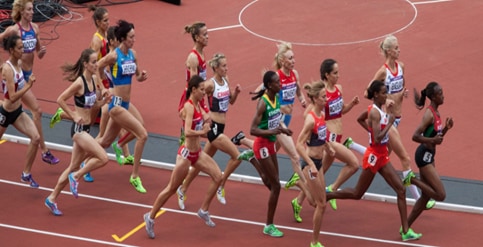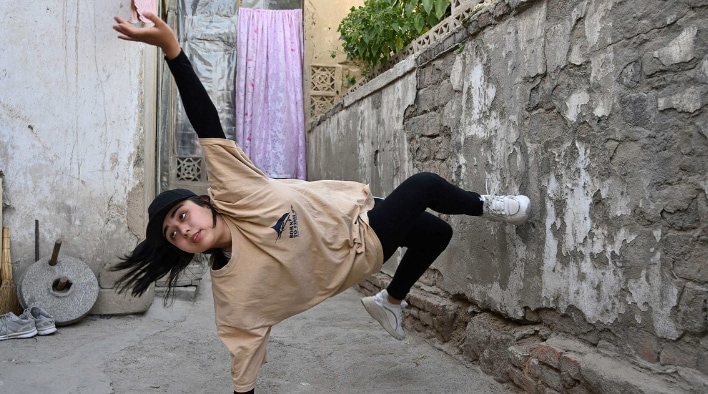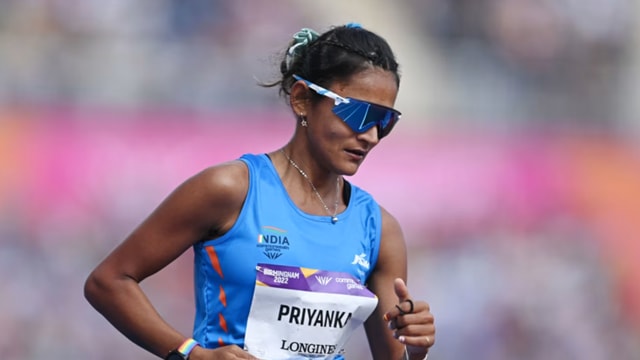| The most gender equal Olympics gets going in Paris five days from now. Not every woman will return home with a medal, but some through sheer grit are already winners. Read on… The big story At the most gender equal Olympics, women to watch  An equal music: Faster, higher, stronger Of course there will be medals. And headliners smashing records and setting new standards. Of course there will be tales of winning and, the vastly more heart-breaking, tales of nearly-winning. Beyond the medals, ranks and records what do these once in four years games represent? Back in Paris after 128 years, this will be the most gender equal Olympics with 5,250 women and just as many men participating. India’s 46 women athletes will make up 41% of the squad, a slight dip from the 53 of 120 (44%) from Tokyo. To understand how far we’ve come consider this: Women made their first appearance in Paris 1900 with 22 of 997 athletes—just over 2%. Until 1984, the marathon was out of bounds for women. And the first time every participating country had at least one female athlete was as recently as 2012, London. Also unprecedented in Paris: A nursery at the Olympic Village where parents can leave their kids. And a pledge by the French National Olympic and Sports Committee to make hotel rooms available for breastfeeding French athletes. In Tokyo 2021 family, including nursing babies, was barred from accompanying athletes, a decision eventually reversed following protest by female athletes, reports The Washington Post. The games mean different things to different folk. For some it is sporting excellence. For others it is fair play. Some seek a comeback, others a safe space for sport, a refuge from hard times. Everyone talks of the Olympic spirit, an intangible but unmissable essence that brings out the best in human beings at a time when our planet is plagued by climate change, war, genocide, ethnic cleansing, rape and violence against women. “On a divided planet, Paris will offer what sport always proposes. A temporary unification. A passing harmony,” writes Rohit Brijnath in The Straits Times. Until they begin making history, here are some women athletes who are already winners for their sheer grit. Antim Panghal, 19, India, Wrestling Born in Haryana, the state with India’s worst female sex ratio, Antim’s name tells you how her parents greeted the birth of their fourth daughter: Enough. The last. Antim. “My parents may not have wanted me before I was born, but once I was here, I have felt nothing but supported and loved,” Antim told Rudraneil Sengupta, journalist and author, Enter the Dangal: Travels through India’s wrestling landscape. That support included selling their home and land in Bhagana village and moving to Hisar city where Antim could be closer to training facilities for women wrestlers. In a state that still practices ghoonghat, or the veil for women, Haryana has proved to be an unlikely cradle for female wrestling with 26 medals, including eight golds in three Olympics, four Asian Games and five Commonwealth Games. Success has spawned its own stories. The legend of the Phogat sisters has only spread after Geeta Phogat won India’s first-ever international gold at the Delhi Commonwealth Games. All-male dangals, or community wrestling competitions, now invite women and girls. Private academies have opened in districts like Hisar and Panipat where girls like Antim are being nurtured. It was a sister who first spotted Antim’s athleticism and advised her to choose a sport. There was no looking back. In 2018, she was an Under-15 national champion. Now 19, she arrives in Paris with a formidable resume: Two-time Under-20 world champion and medals in an assortment of colours at the Asian Games, Asian Championships and senior world wrestling championships. She’s also the first Indian woman to win a gold medal at the U-20 wrestling world championships. In 2022, Antim almost defeated Vinesh Phogat, India’s most accomplished woman wrestler, at the Commonwealth Games selection trials in Birmingham. Vinesh would go on to win the title, but Antim’s reputation had been sealed. Manizha Talash, 21, Olympic Refugee Team, Breakdancing  Manizha Talash in Kabul, 2021 Adek Berry/AFP The Washington Post calls her one of the most compelling—and unlikely—athletes at the Paris Olympics. Afghanistan’s first female breakdancer, 21-year-old Manizha Talash and her sport both will make their debut at the Olympics this summer. Manizha began breaking before the Taliban returned and even back then, the idea of a young girl dancing didn’t sit easy in conservative Afghan society. But when the Taliban took over after NATO forces and the US military left in 2021, it was time to go. Leaving behind her single mother and two younger siblings, Manizha and the crew fled to Pakistan. For a year they lived illegally without papers, and then finally with the help of a Spanish refugee organisation, were granted asylum in Spain. Her first job was at a hair salon, reports Vogue but, after work, she found a gym where she could go and dance. Then a friend helped her make contact with the Refugee Olympic Team. And by March this year, Manizha had won a scholarship, relocated to Madrid and begun training. In Paris, she faces 16 other women competing for a medal. Unlike the others, Manizha will be competing not under her country’s flag but as a member of the Refugee Olympic Team, set up at the 2016 Olympics to recognise displaced athletes who can no longer live and train in their home countries. Priyanka Goswami, 28, India, Racewalking  IOC That day in school, there was a special guest at the morning assembly. He was a gymnastics teacher. Did anyone want to sign up?. One hand that shot up was that of sixth grader Priyanka Goswami. Her dad worked as a bus conductor with the Uttar Pradesh roadways department, her mother was a homemaker. They knew next to nothing about sport except that their daughter loved to play and was game to try anything new. Within a few months, Priyanka was in a sports hostel in Lucknow. She was homesick and found some of the gymnastics moves, particularly on the beam, scary. But, she had the courage to return to Meerut and reset her aspirations to athletics and track. It’s been a long journey from Meerut, where her family lives, to Paris. When I speak to her on the phone, she’s in Poland at a training camp along with the rest of the athletics team. How did she end up racewalking, a long-distance subset within athletics where the rules are that one foot must be in contact with the ground at all times? She laughs as she recalls how at a district-level competition only three girls had signed up for this event. So, there was a good chance she’d win. Smart thinking. She took home a bronze. At her Olympic debut in Tokyo, Priyanka came in at 17 in the 20km. “Even finishing in the top 20 is really tough,” says Deepthi Bopaiah, CEO of the GoSports Foundation, a non-profit founded in 2008 that this year has trained and worked with 13 athletes, including five women, headed to Paris. Priyanka has two events lined up: The 20 km and a mixed men and women’s team event. She isn’t shy of owning her ambition, which is to ‘make history’ with a medal. “Naam aur shaan (name and fame),” she says. Adds Deepthi: “She’s a real role model, this girl from a small town who is dreaming big and has made her own path.” Nikki Hiltz, 29, USA, Middle distance running  Runners World “This is bigger than just me,” Nikki who identifies as transgender and non-binary said after they won a spot in the US Olympic team. The 29-year-old was assigned female at birth. On June 30, the last day of Pride month at the Olympic trials they qualified in the 1,500m clocking 3:55:33. “I wanted to run this one for my community,” they later said. “All the LGBTQ folks, you guys brought me home the last 100.” The inclusion of transgender athletes has been a thorny issue for some years now. Despite the flak she’s received for being ‘transphobic’, nine-time Wimbledon champion and an open advocate for LGBTQ rights Martina Navratilova remains unapologetic about arguing that people who are born male should not be allowed to compete in women’s sport. In 2004, the International Olympic Committee (IOC) opened the games to transgender athletes for the first time but, with certain conditions including hormone therapy. The issue remains unresolved. On Wednesday, the European Court of Human Rights began its hearing on whether 33-year-old South African middle-distance runner Caster Semenya would be required to lower her testosterone levels in order to compete professionally. In 2021, the IOC updated it policies to allow each governing bodies of individual sports to formulate their own policies on participation. Nikki sidesteps the controversy but her presence in Paris will be a reminder, yet again, that the issue is far from resolved. |